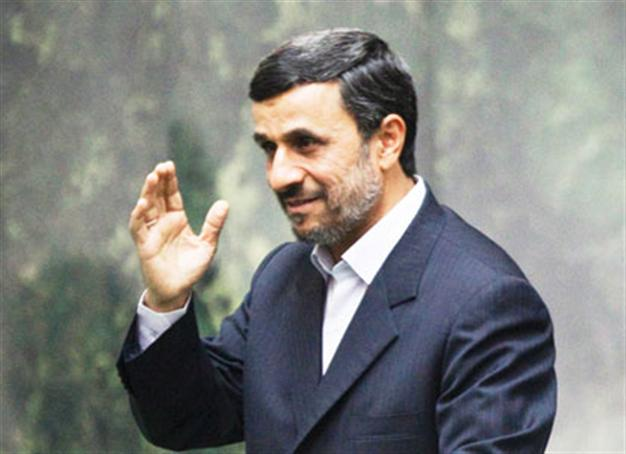Fresh report to fuel Iran-West nuke row
TEHRAN / VIENNA

Iranian President Mahmoud Ahmadinejad. REUTERS Photo
Tehran has reacted angrily to a United Nations report that says the Islamic republic is on the brink of developing an atomic bomb, vowing to continue with its nuclear program but denying that it is seeking such weapons of mass destruction.
Promising not to retreat “one iota” on its atomic program, Iranian President Mahmoud Ahmadinejad said it did not make sense for Iran to build nuclear weapons in a world already awash with atomic arms.
“The Iranian nation is wise. It won’t build two bombs against 20,000 [nuclear] bombs you have,” he said in comments apparently directed at the West and others. “But it builds something you can’t respond to: ethics, decency, monotheism and justice.”
Ahmadinejad also strongly chided the U.N. International Atomic Energy Agency (IAEA) for its report, saying the agency was discrediting itself by siding with “absurd” American accusations.
Harshly criticizing Iran, Israeli Prime Minister Benjamin Netanyahu said yesterday that the world must act to prevent Iran from acquiring nuclear weapons.
“The significance of the report is that the international community must bring about the cessation of Iran’s
pursuit of nuclear weapons which endanger the peace of the world and of the Middle East,” he said in a statement issued by his office.
Israel’s military radio had earlier reported that Netanyahu had ordered his ministers not to comment on the matter out of concern that any statement or Israeli move would draw international criticism and would play into Iran’s hands.
The IAEA said Iran appeared to have worked on designing an atomic bomb and may still be conducting secret research. Citing what it called “credible” information from member states and elsewhere, the agency listed a series of activities applicable to developing nuclear weapons, such as high explosives testing and the development of an atomic bomb trigger.
The report detailed evidence apparently showing concerted, covert efforts to acquire the capability to make atomic bombs. Some of the cited research and development work by Iran have both civilian and military applications, but “others are specific to nuclear weapons,” said the report.
The United States, Iran’s long-time foe, may impose more sanctions on Iran, possibly on commercial banks or front companies, but is unlikely to take further steps against the Islamic republic’s oil and gas industry or go after the central bank for now, a U.S. official said Nov. 8.
Support from Russia
Tehran’s key ally, Moscow, has given the Islamic republic a major boost, rejecting tighter sanctions. “Any additional sanctions against Iran will be interpreted by the international community as a means of changing the regime in Tehran,” Deputy Foreign Minister Gennady Gatilov told Interfax. “This approach is unacceptable to us, and Russia does not intend to review this proposal,” he said, without specifying if Moscow would actually veto further sanctions.
Another close ally China issued cautious statements calling for diplomacy and dialogue. Foreign Ministry spokesman Hong Lei called on Iran to be “serious and flexible” and to cooperate with the International Atomic Energy Agency.
Hong said the agency, in turn, should be “objective” and committed to clarifying issues. “At present we believe that all parties should do more to facilitate dialogue and cooperation,” Hong said at a regular news briefing.
Commenting on the findings, an EU spokeswoman said the IAEA’s finding “seriously aggravates existing concerns on the nature of the Iranian nuclear program, since this report puts particular emphasis on information corroborated by the IAEA regarding possible military dimensions to Iran’s nuclear program.”
Britain also warned that it would take new measures if Tehran did not “change direction.” Foreign Secretary William Hague further warned that Iran’s nuclear program risked undermining gains made in the Middle East during the Arab Spring.
“The assertions of recent years by Iran that their nuclear program is wholly for peaceful purposes are completely discredited by this report,” Hague told parliament.
France, meanwhile, said it was ready to push for “unprecedented” sanctions against Iran if it refused to answer new questions about its nuclear program while also calling for a new Security Council meeting.
Foreign Minister Alain Juppe said in a statement that if Iran failed to answer the concerns raised in the report, the international community should raise diplomatic pressure to a new level.
German Foreign Minister Guido Westerwelle said the report on Iran’s nuclear drive was “alarming” and that new sanctions would be inevitable if Iran refused to participate in serious talks.
Compiled from AFP, AP and Reuters stories by the Daily News staff.
















